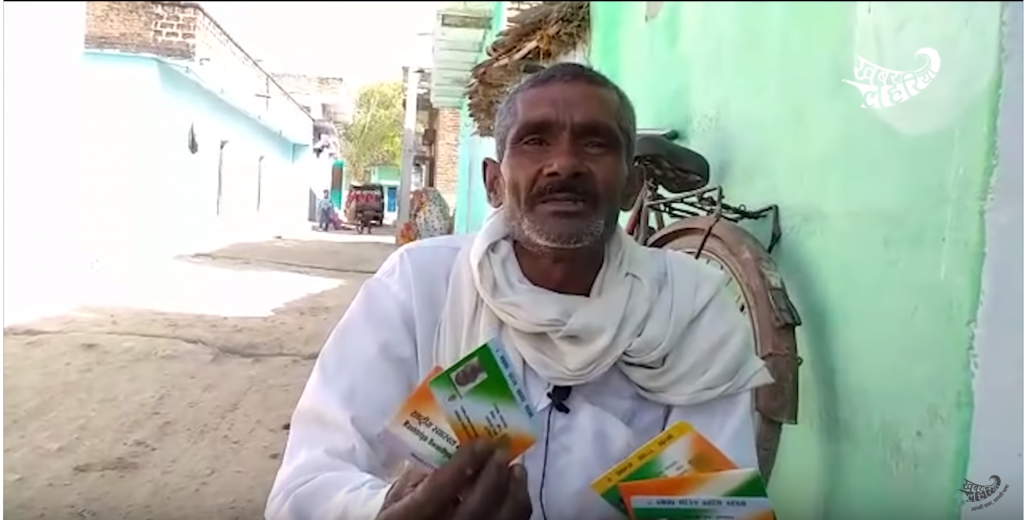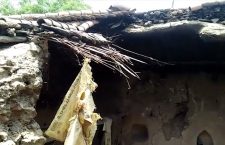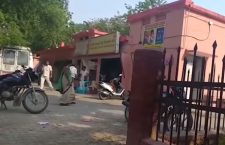Shivdevi has been paralyzed from the waist down ever since she was administered an injection meant to cure a fever. This was in 2002. She has not been able to walk for the last 17 years. No matter what she eats or drinks, her condition remains unchanged.
Too poor to fund an operation, Shivdevi could only buy medicines. But no medicines have helped. Neither has the fabled Ayushman Bharat or the Pradhan Mantri Jan Arogya Yojana (PM-JAY).
Shivdevi’s family’s hopes for her treatment after the announcement of the insurance cover were soon doused.
“At the district hospital in Mahoba, we understood that the card has no use. The doctors refused to treat us. We stood waiting the whole night in the peak heat of summer, out on the streets. From the Mahoba hospital, we were referred to a hospital in Gwalior. There, too, nothing happened,” said Deepu, Shivdevi’s son.
PM-JAY beneficiary cards seem to have yielded no results for most residents of Samrat village in Jaitpur block of Uttar Pradesh’s Mahoba. Launched on September 25, 2018, it aims to provide financial protection to 10.74 crore poor, deprived rural families and occupational categories of urban workers’ families identified by the latest Socio-Economic Caste Census (SECC). It promises a benefit cover of Rs 5,00,000 per family per year, covering medical and hospitalization expenses for almost all secondary care and most tertiary care procedures in all government hospitals and empanelled private hospitals.
At a press conference last February, former Union minister for health and family welfare J.P. Nadda was quoted as having said, “Ayushman Bharat has emerged as the largest health scheme in the world, benefitting over 10 lakh patients since its launch. It has created an atmosphere of positivity.”
The government has claimed that around two crore beneficiary e-cards have been used.
In Uttar Pradesh alone, 1.18 crore households have been deemed eligible for the card and 15 lakh of these have been issued cards, the government has said.
But the data also says that only around 31,000 beneficiaries have been admitted to hospitals for treatment under the medical cover. The number is visibly much lower than 15 lakh.
At a press conference last February, former Union minister for health and family welfare J.P. Nadda was quoted as having said, “Ayushman Bharat has emerged as the largest health scheme in the world, benefitting over 10 lakh patients since its launch. It has created an atmosphere of positivity.”
The government has claimed that around two crore beneficiary e-cards have been used.
In Uttar Pradesh alone, 1.18 crore households have been deemed eligible for the card and 15 lakh of these have been issued cards, the government has said.
But the data also says that only around 31,000 beneficiaries have been admitted to hospitals for treatment under the medical cover. The number is visibly much lower than 15 lakh.
Samrat village reflects the gap in the number of people who have been issued cards and the actual number who have received benefits.
Baldhari, who lives in Samrat. got four cards made, one for each member of his family. He paid Rs 100 for each to a government official.
“None of these cards are useful for treatment. We are not receiving any reimbursements. We have to pay ourselves for the medicine we buy. What to do with these cards now?” he asks.
His lines are echoed by Lakshmi, another Samrat resident. “My eldest child had to have an operation recently and we found that we had to spend the money from our pockets. The card has no benefits.”
Like them, around 445 residents of the village have gotten their cards made, says Samrat’s auxiliary nurse midwife (ANM), Gayatri Devi. Along with the ASHA worker there, Gayatri Devi had informed all the village’s households of the benefits of applying for this card.
“I told them that if they have some major disease or need to undergo a hospital procedure like a surgery, they can get treated for free, up to a limit of Rs 5 lakh,” she says.
This led many households to apply and yet more have still been applying, although none of the people Khabar Lahariya spoke to had received any benefits.
The problem could lie with people who have been approaching hospitals not empanelled under the scheme, says Suman, the chief medical officer (CMO) at the Mahoba District Hospital. “Not all private hospitals are empanelled. People should only go to the ones that are. The list can be accessed from officials here,” she says.
However, the CMO also admitted that no private hospital is empanelled under the scheme in Mahoba district. For now, those who are in possession of a card have to go to the lone district hospital to avail themselves of scheme benefits. That district hospital, notably, does not even have facilities for a basic surgery.
The central government’s budget for 2019-20 saw an increase in the fund allocation for Ayushman Bharat by 166% from the previous year. It remains to be seen now if the scheme will continue to rely primarily on the services of the under-equipped infrastructure of public hospitals.

